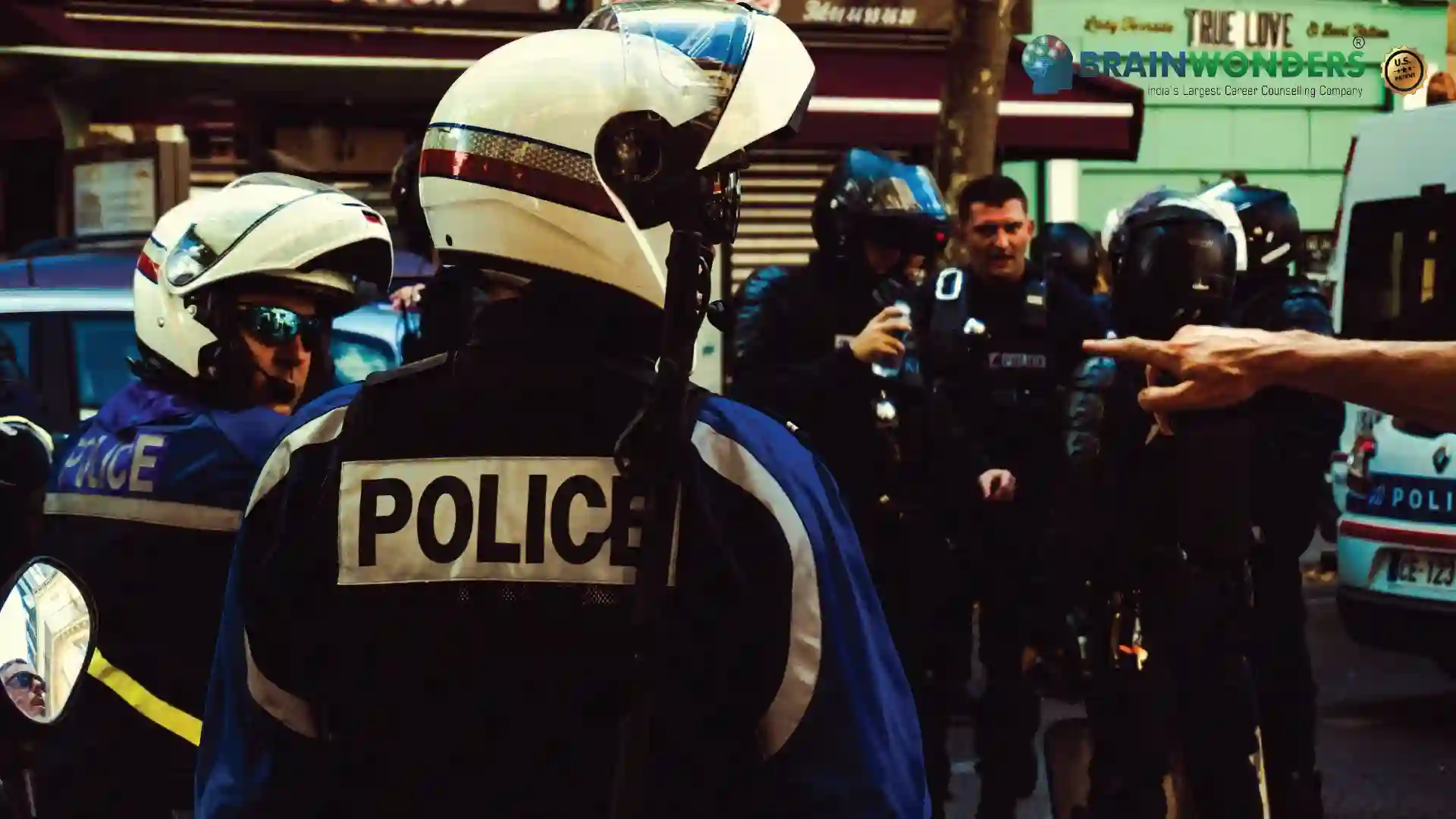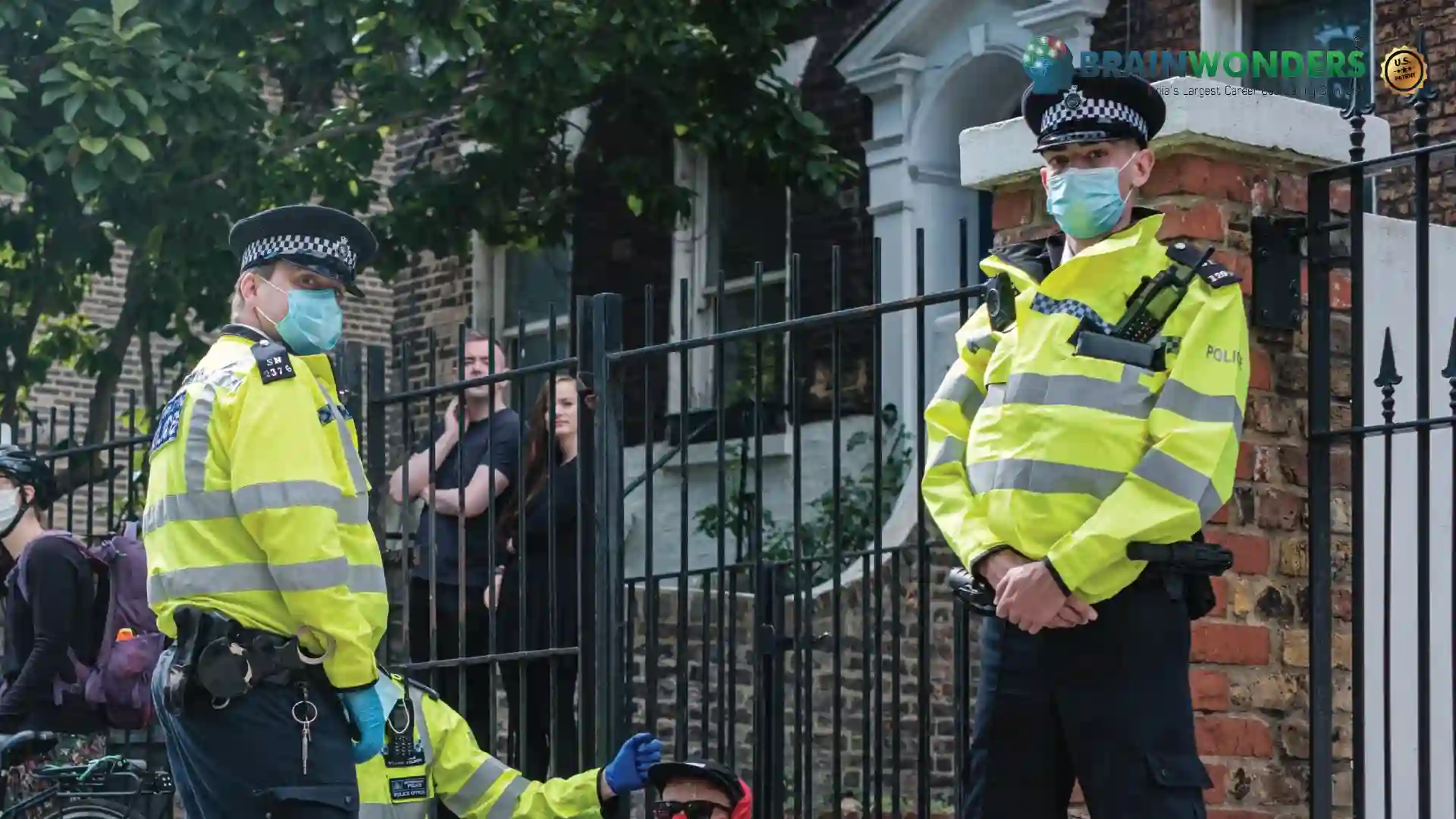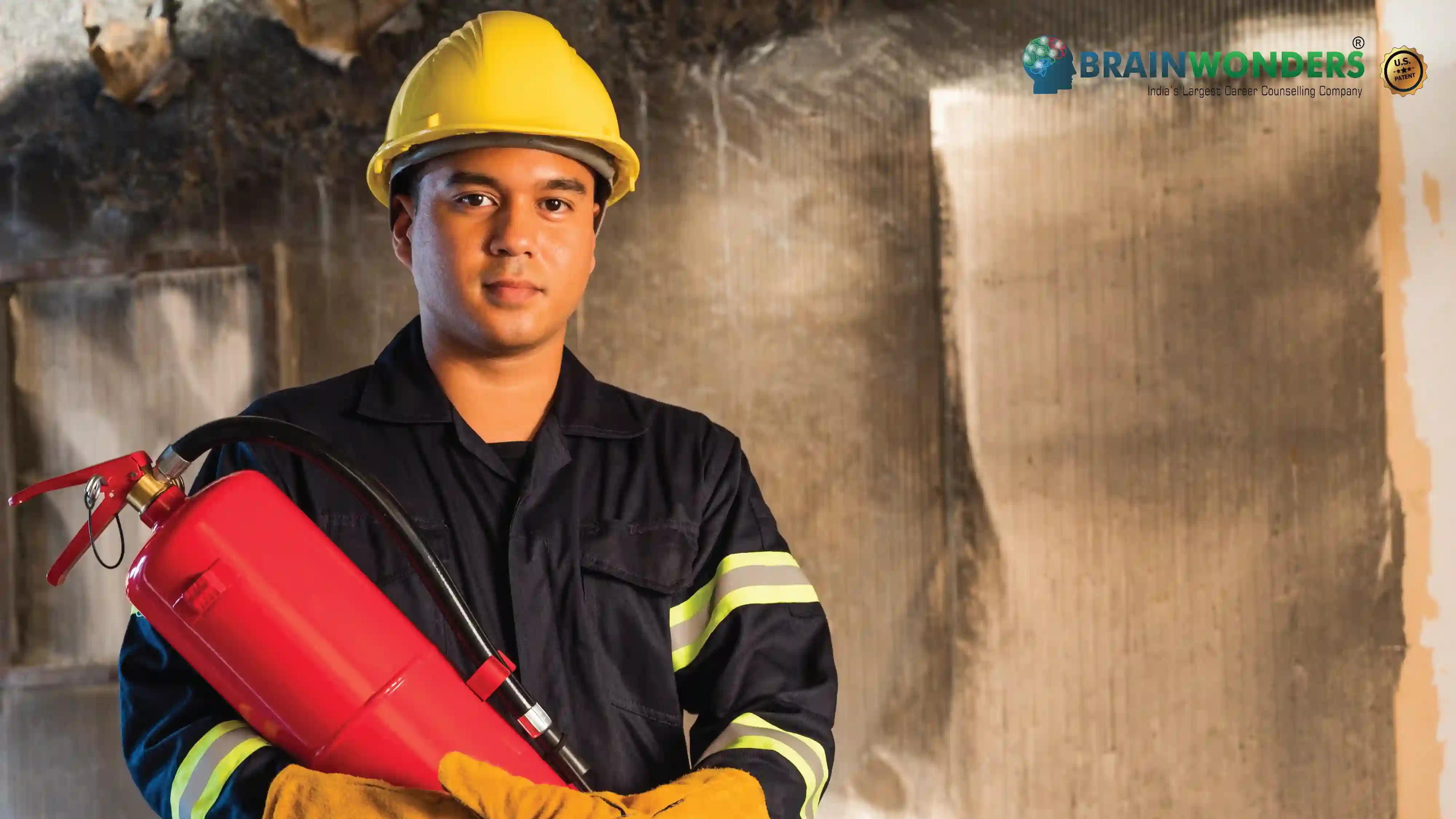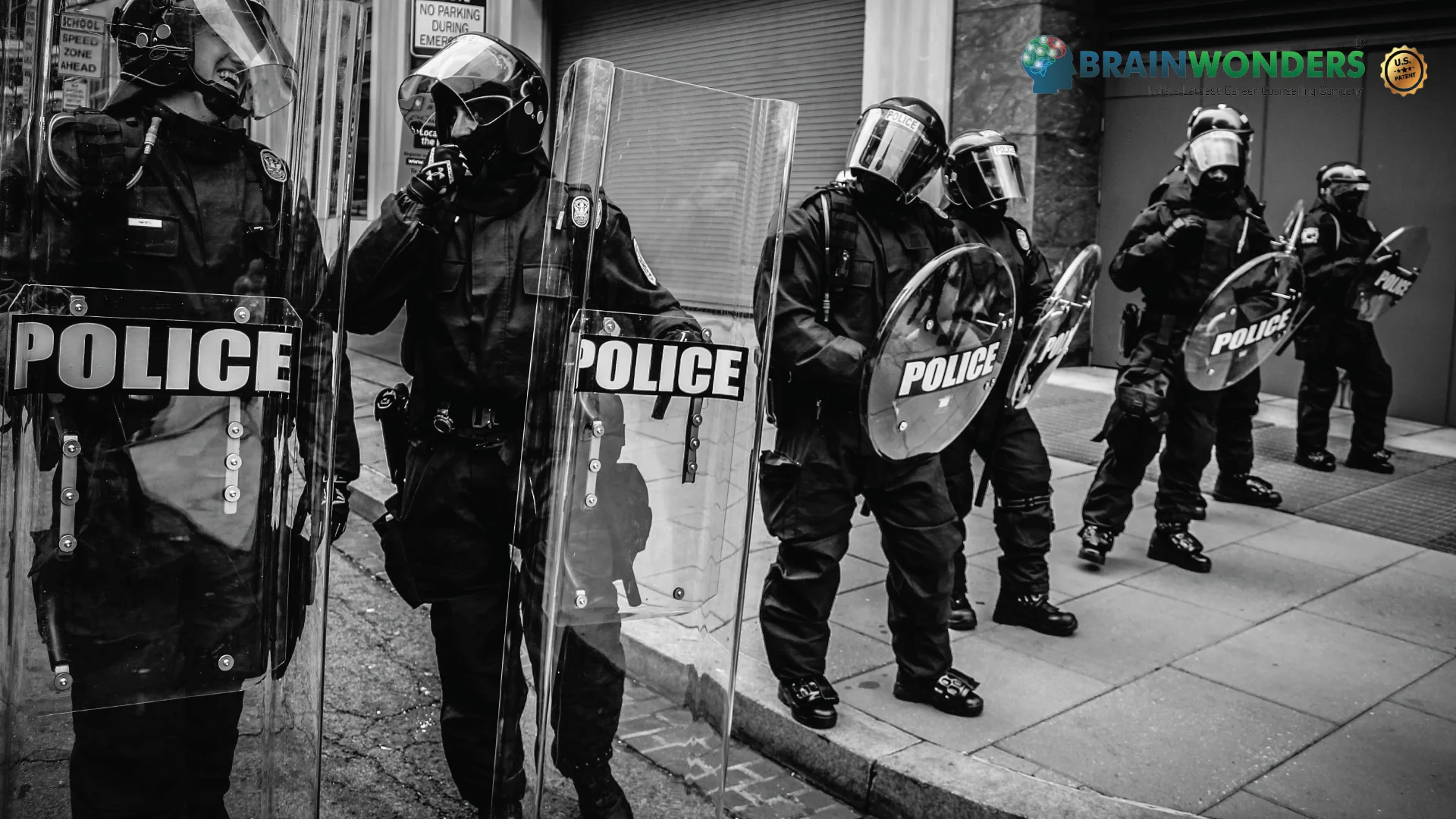How to become a Police Inspector
Overview, Courses, Exam, Colleges, Pathways, Salary

Overview
Who is Police Inspector ?
In India, police inspectors usually control a police station's operations. The Police inspector rank is higher than the sub-inspector rank and lower than the deputy superintendent rank. They manage teams of sergeants, constables, and police staff and portfolios. The ability to properly manage and reduce risk is essential for inspectors to protect the safety and well-being of officers, personnel, and the general public and react quickly and effectively to issues, incidents, and criminal activity. They guide the deployment of resources to events, especially significant occurrences, in a timely and effective manner, with little waste. By enforcing law and order, obtaining warrants, arresting and interviewing suspects, securing crime and accident scenes, and testifying in court, Police inspectors protect, ensure public safety, and serve the community by working towards a crime-free society.
Typical day at work
What does Police Inspector do?
Job Description, Roles, Duties, Tasks, and Responsibilities:
- Register complaints and FIRs and draft charge sheets
- Recognize, convict, and arrest suspects and convicted offenders
- Collect information about accidents and events to prepare reports
- Provide first aid to victims of accidents or crimes for physical injuries
- Review incident facts to establish whether any criminal acts or violations of law were involved
- Monitor, report, and investigate suspects and unusual or unlawful activity
- Testify to present evidence or serve as witness in courts for criminal cases
- Forward complaint and emergency-request information to relevant personnel
- Investigate road and other accidents to ascertain the causes and whether a crime was committed
- Process and maintain records of prisoners during booking and pre-trial hearings
- Check vitals of a victim for signs of life
- Take statements from various individuals and record interviews
- Protect the dead body to collect evidence and prevent onlookers from meddling with it before the arrival of medical examiner
- Report the investigation progress, secure information files on offenders, and send reports to the commanding officer or magistrate to allow arrest warrant
- Support answers to allegations or charges lodged and prepare for other information for court cases
- Gather and examine evidence from suspects, witness, and crime scenes for loose hairs, clothing, weapons, bloodstains, fingerprints, etc.
- Preserve obtained evidence items from crime scenes by placing them in containers
- Acquire incident summary from the in-charge officer at crime scene
- Proofread and check completed reports to determine the requirement of further information or investigative work
- Organize and assist in search, raids, and arrest
- Delegate specific work tasks and areas of search to subordinate officers
- Check establishment surveillance to obtain suspect identification information
- Protect and check on unconscious victims to obtain statements when consciousness is recovered
- Coordinate with other public and government agencies and to fight particular kinds of crime
- Protect and support undercover agents observing and photographing narcotic purchase transactions to bust the criminals with evidence.
Abilities and Aptitude needed
What are the skills, abilities & aptitude needed to become Police Inspector?
Individuals who are patriotic, passionate to serve the nation, have ample knowledge of the Indian Constitution, Laws, and other rules and regulations, and desire to contribute to national peace is fit to become Police inspectors. This necessitates their being in good bodily and mental health.
They must be at ease, firm, and relaxed while interacting with folks, even when conversing with them during hostile circumstances. Furthermore, they must be proficient in interviewing and forceful in the face of violence and antagonism.
Some other talents necessary include problem-solving abilities and judgement, negotiating and decision-making abilities, and organizing and analytical abilities. They also need to be efficient in leadership, team and time management, such as meeting deadlines, prioritizing tasks, and taking personal responsibility for a professional workload. They must have excellent writing and verbal communication abilities and outstanding interpersonal skills since they deal with a lot of paperwork.
The field also demands self-discipline, patience, punctuality, commitment, determination, self-confidence for the intense training they go through. This also requires them to have good stamina and physical fitness. To be a part of the armed forces, integrity and having a sense of responsibility is crucial.
When they are on the ground, they need to be an alert, courageous team player, dependable and look out for their colleagues. Having leadership skills acts as an added benefit.
They must accept the responsibility attached to the limitless power. Working in rugged surroundings and at strange hours requires excellent effort, mental awareness, flexibility, and adaptation to manage the situation appropriately. A proactive approach in planning and management is also expected.
Salary
Salary for Police Inspector?
Salary of Police Inspectors is as follows :
- Minimum Monthly Salary: The minimum monthly salary for an entry-level police inspector may vary based on the region, department, and experience level. It could range from INR 25,000 to INR 40,000 or more in India.
- Maximum Monthly Salary: Highly experienced and skilled police inspectors, especially those in senior positions or with specialized training, may earn a monthly salary ranging from INR 70,000 to INR 1,00,000 or more.
- Annual Salary: The annual salary for entry-level police inspectors could be approximately INR 3 lakhs to INR 5 lakhs per year. Experienced and well-qualified inspectors may earn a maximum yearly salary ranging from INR 8 lakhs to INR 12 lakhs or more.
- Highest-Paying Jobs and Scope: The highest-paying jobs for police inspectors are often found in specialized units, such as SWAT teams, anti-terrorist units, or investigative divisions. Advancement opportunities exist for inspectors with exemplary performance, leadership skills, and additional training in cybercrime, narcotics, or community policing. Police inspectors play a crucial role in maintaining public safety, enforcing the rule of law, and ensuring the well-being and security of the communities they serve. Their leadership, experience, and expertise contribute significantly to effective law enforcement operations and society's overall safety and security.
Pathways
How to become an Police Inspector?
Entrance Exam
Entrance Exam for Police Inspector ?
Courses
Which course I can pursue?
Best Colleges
Which are the best colleges to attend to become an Police Inspector?
Industries
Which Industries are open for Police Inspector?
Police inspectors typically work within the law enforcement sector and hold supervisory positions within police departments or agencies. While their primary role is within law enforcement, police inspectors may have opportunities to work in various specialized units or related industries. Some industries and areas where a police inspector may find employment or related opportunities include:
- Criminal Investigations: Police inspectors often lead or supervise criminal investigations into serious crimes, such as homicides, robberies, or fraud cases.
- Special Weapons and Tactics (SWAT) Teams: Some police inspectors may join elite teams responsible for handling high-risk situations like hostage rescues or armed confrontations.
- Narcotics and Vice Units: Police inspectors may lead units investigating drug trafficking, illegal substances, or vice-related crimes.
- Cybercrime and Technology: As cybercrime becomes more prevalent, police inspectors may work in specialized units dealing with digital investigations and cybersecurity.
- Fraud and Financial Crimes: Police inspectors can investigate white-collar crimes, financial fraud, and economic offenses.
- Counterterrorism: Inspectors may work in units focused on countering terrorism and protecting national security.
- Public Safety and Emergency Management: Some police inspectors may be involved in disaster response and emergency management efforts, collaborating with other agencies and first responders.
- Private Security: Retired or former police inspectors may work in private security firms, providing consulting services, executive protection, or risk assessment.
- Teaching and Training: Experienced police inspectors may transition to teaching and training roles, instructing police recruits or delivering specialized law enforcement courses.
- Government Agencies: Police inspectors may find opportunities in government agencies like the Central Bureau of Investigation (CBI) or other specialized law enforcement bodies.
- Consulting: Police inspectors with extensive experience may work as law enforcement consultants, providing expertise to legal firms, corporations, or international organizations.
internship
Are there internships available for Police Inspector?
Internship opportunities specifically designed for police inspectors may be less common compared to entry-level law enforcement internships for police officers or cadets. However, police inspectors or experienced law enforcement professionals seeking additional training or specialization may find specific internship-like opportunities within law enforcement agencies, specialized units, or related fields. Here are some potential internship opportunities for police inspectors:
- Advanced Training Programs: Some law enforcement agencies offer advanced training programs for experienced officers and inspectors to enhance their skills in specialized areas such as cybercrime, counterterrorism, or crisis negotiation.
- Criminal Investigation Internship: Inspectors looking to further their expertise in criminal investigations may seek opportunities to intern with specialized investigation units or major crime task forces.
- Leadership Development: Some law enforcement agencies provide leadership development programs or internships for officers and inspectors to prepare them for higher supervisory roles.
- Forensics Internship: Police inspectors interested in forensic science and evidence analysis may explore internships with crime labs or forensic investigation units.
- Policy and Procedure Review: Inspectors with experience in policy development may intern with police departments or government agencies to review and refine law enforcement policies and procedures.
- Community Outreach and Engagement: Inspectors may participate in community engagement programs or initiatives to build positive relationships between law enforcement and the public.
- Research and Analysis: Some agencies or think tanks may offer internships for inspectors interested in conducting research and analysis related to law enforcement practices or policy development.
- Specialized Units: Inspectors seeking exposure to specialized units, such as SWAT, narcotics, or intelligence, may inquire about temporary assignments or shadowing opportunities.
- Internal Affairs: Experienced inspectors may intern with internal affairs divisions to gain insights into investigating and addressing allegations of misconduct within the department.
- Emergency Management and Preparedness: Inspectors may intern with emergency management agencies to learn about disaster response, crisis management, and public safety planning.
Career outlook
What does the future look like for Police Inspector?
The job opportunities in police or law enforcement are vast. One can pursue a career in the capacity of a police inspector as a non-gazetted officer that includes the positions of Inspector of Police, Assistant Inspector of Police, Sub-Inspector of Police, and Assistant Sub-Inspector Police. The Inspector of Police is the highest officer post in charge of a police station in a particular locality. The Assistant Inspector of Police takes the police station's responsibility when the Inspector of Police is absent. A post below is of a sub-inspector that can file a charge sheet in court and is generally the first investigating officer. The Assistant Sub-Inspector of Police manages constables and other officers below them.
In the case of a gazetted police officer, a police inspector can look for Additional Commissioner of Police, Deputy Commissioner of Police, Senior Assistant Commissioner of Police, Assistant Commissioner of Police, Special Commissioner of Police, Commissioner of Police and Joint Commissioner of Police.
A police inspector can also be appointed for other national and international job opportunities such as Criminal Investigation Department (CID) and Detective Agency.
These police officers have to work and operate around the clock. In emergencies, they have to work overtime, night shifts, or even on holidays. The job comes with many risks as they regularly face various criminals and dangerous situations.







